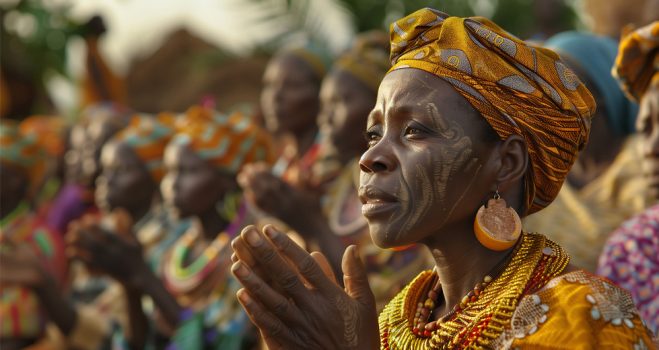In the heart of South Sudan, where the scars of civil war, communal violence, and entrenched militarization run deep, women continue to bear the weight of unimaginable struggles. Their lives are interwoven with the violence that has permeated their nation, yet they stand at the forefront of the fight for peace, healing, and reconciliation. Amidst the chaos, women in South Sudan have emerged as pillars of peace-building, standing in resistance to the very forces that have ravaged their communities.
One such movement is the National Women Link, formed in December 2013 under the South Sudan Council of Churches (SSCC). It unites women from various SSCC member churches, parliament, and civil society organizations. The group’s founder, Mama Lily, described the plight of South Sudan as akin to the biblical story of the woman who bled for 12 years, from Luke 8:43-48. “Sudan is bleeding,” she says, but just as the woman sought healing, so too do the women of South Sudan—desperate for peace in a nation torn apart by violence.
In their bid to seek justice and healing, the National Women Link partnered with World Communion of Reformed Churches and the Council for World Mission (CWM) hosted a powerful three-day conference from September 24 to 28, 2024, in Juab, South Sudan. Themed “War, Women, Empire/Faith, Resistance, and Empowerment,” the conference brought together more than 25 participants from Sri Lanka, Mexico, Nigeria, Australia, Hong Kong, Japan, Cameroon, Canada, Jamaica, South Africa, Burundi, Malawi, India and South Sudan—to share their stories and explore how faith and resistance can empower women in conflict zones.
Through their testimonies, women from South Sudan shared how they continue to resist war and promote peace in the face of militarization. The conference served as a vital platform for dialogue, as participants broke into smaller groups to explore how Christianity’s stance on militarism intersects with gender. Together, they examined how the church can resist war while empowering women to lead in peacemaking.
Keynote speaker Clare Daly confronted the issue head-on, linking the Gaza conflict to broader patterns of global militarization, orchestrated by dominant nations. She highlighted the complicity of women in positions of power who operate within patriarchal systems, using the rhetoric of democracy to disguise the violence at its core. Daly underscored the roots of this oppression in colonialism and Western domination, urging women of faith to see through the myths that perpetuate these conflicts.
“Myths are crafted to justify domination, with white nations portrayed as heroes saving women from ‘barbaric’ men,” Daly argued. She emphasized how the idolization of military might fuels ongoing wars. Jude Fernando, another voice at the conference, echoed these concerns, pointing to the militarization in regions like Mexico, Okinawa, and the Philippines, and urging interfaith communities to unite against such oppressive forces.
Monica Melanchthon, a South Sudanese faith leader, added to the conversation by challenging the misuse of the Bible in justifying military power. She urged participants to look deeper into the scripture, which, when properly understood, offers examples of women’s resilience, protest, and defiance against unjust systems. “The Bible is full of stories of subtle yet powerful resistance,” she said, encouraging women to draw strength from these examples in their current struggles against war and militarization.
This gathering of women, both local and international, was more than just a conference—it was a global call to action, a moment of reflection for the church in the face of the destructive forces of militarism and empire. It challenged the Christian faith to confront these injustices head-on, while empowering women to lead the way towards a more peaceful and just world.
As South Sudan continues to bleed, its women rise in resistance, grounded in faith and unwavering in their pursuit of peace. And the question remains: where does the church go from here? Will it stand with these women in their fight against war, or remain complicit in the systems that perpetuate violence? The future of peace in South Sudan—and beyond—may well rest on the answer.


